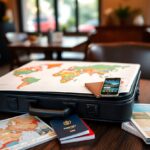
With the right strategies, you can explore the world without breaking the bank. By planning carefully and making smart choices, you can stretch your travel funds further and enjoy rich experiences in diverse destinations. This guide will provide you with practical tips on saving money on flights, accommodation, food, and activities, empowering you to launch on your global adventures confidently and affordably. Whether you’re a seasoned traveler or just starting out, you’ll discover ways to travel the world on a budget effectively.
Key Takeaways:
- Plan and book flights in advance to secure the best deals and discounts.
- Opt for budget accommodations like hostels, guesthouses, or vacation rentals instead of hotels.
- Use public transportation or walk instead of taxis to save money while exploring.
- Eat like a local by trying street food or cooking your own meals to reduce food expenses.
- Travel during the off-season to benefit from lower prices and fewer crowds.
Budget Planning
Your travel adventure begins with a clear budget plan that outlines your estimated expenses for transportation, accommodation, food, and activities. By setting financial limits upfront, you can make informed decisions that keep your trip affordable and enjoyable. Tracking your spending along the way helps you stay on course and avoid unexpected costs.
Transportation
Between buses, trains, and budget airlines, you have many options to get around affordably. Research discount cards, book tickets in advance, and remain flexible with your travel dates to find the best deals, allowing you to stretch your budget further while exploring diverse destinations.
Accommodation
Across various countries, accommodations range from hostels to guesthouses and budget hotels, providing affordable choices for every traveler. Utilize booking platforms that offer discounts, and consider shared stays or home rentals to save money without sacrificing comfort.
At times, staying in local guesthouses or hostels not only cuts costs but also offers an authentic experience of the culture. Look for accommodations that include amenities like free Wi-Fi or breakfast, which add value and help reduce daily expenses.
Food
By opting for street food, local markets, or cooking some of your own meals, you can enjoy delicious, budget-friendly dining options. Seek out where locals eat to get fresh, affordable dishes and avoid pricey tourist traps on your journey.
Considering dietary preferences and local specialties, you can find nutritious and inexpensive meals by exploring small eateries and grocery stores. This approach safeguards your health and wallet, ensuring that your culinary experience enriches your travel without overspending.
Tools for Finding Cheap Flights and Deals
Clearly, leveraging the right tools can transform how you find affordable flights and travel deals. You should use flight comparison websites like Skyscanner or Google Flights to quickly scan numerous airlines and dates, enabling you to spot the best prices. Setting up fare alerts helps you track price drops on your chosen routes, giving you the chance to book at the lowest rates. Additionally, exploring travel deal newsletters and apps can provide exclusive discounts and flash sales tailored to your preferences, ensuring you never miss out on budget-friendly opportunities while planning your trip.
Affordable Lodging Options
Now that you’re planning your budget travels, finding affordable lodging is vital to stretch your funds. Exploring options beyond traditional hotels can lead you to unique stays that save money and enrich your experience. Whether you choose hostels, couchsurfing, or work exchanges, each offers a way to connect with locals and fellow travelers while keeping your accommodation costs low.
Staying in Hostels
The hostel scene welcomes you with low prices and a social atmosphere. You can book dormitory beds or private rooms depending on your budget and privacy preference. Hostels often provide communal kitchens and events, giving you a chance to meet people and share tips, making them an excellent base for budget travelers.
Couchsurfing
Affordable lodging takes a personal turn with couchsurfing, where locals open their homes for free stays. It’s a way to save on accommodation while immersing yourself in the culture and community of your destination. You’ll make friends and gain insights that typical lodgings can’t offer.
Plus, couchsurfing encourages meaningful interactions with hosts who are eager to share local secrets and experiences. This cultural exchange enriches your travel and often leads to long-lasting friendships, making your journey more personal and memorable without any cost to your accommodation budget.
Work Exchanges
About work exchanges, you trade your skills or labor for room and board. Whether it’s farming, hostel work, or helping with tours, you get to stay affordably while gaining new experiences and connections. It’s an excellent option if you have flexible time and want to contribute during your travels.
Another advantage of work exchanges is the opportunity to learn new skills or languages in a hands-on environment. This form of lodging not only reduces your expenses but also allows you to probe deeper into the local lifestyle, creating a more immersive and rewarding travel experience.
Daily Cost Breakdown Examples by Region
All regions offer unique opportunities to stretch your travel budget, and understanding daily expenses is key to planning effectively. In Southeast Asia, for example, you can often cover meals, transport, and accommodations under $30 a day by choosing local options. Meanwhile, European cities might require a higher daily budget, around $70, especially if you want to experience cultural sites and dine out. South America generally falls in between, with daily costs averaging around $40. By tailoring your spending to each region’s typical expenses, you gain greater control over your finances and enhance your travel experience.
Pro Tips to Avoid Hidden Costs
Once again, avoiding hidden costs can significantly stretch your travel budget. You should:
- Research visa requirements and fees in advance to prevent unexpected charges.
- Check for extra baggage fees and weigh your luggage before heading to the airport.
- Use local transportation instead of taxis to save money.
- Confirm if accommodation taxes or resort fees are included in your booking.
After carefully planning and being vigilant about these expenses, you can enjoy your travel without financial surprises.
To wrap up
Conclusively, mastering how to travel the world on a budget requires strategic planning and smart choices. By prioritizing affordable accommodations, using public transportation, seeking local dining options, and embracing free or low-cost activities, you can explore more without overspending. Leveraging travel deals, booking in advance, and staying flexible with your itinerary also help maximize your resources. With these approaches, you’ll not only stretch your money further but also enhance your travel experience, making global adventures accessible and enjoyable wherever you go.
Q: What are the best ways to find affordable flights when traveling on a budget?
A: To find affordable flights, consider booking well in advance or being flexible with your travel dates and destinations. Use flight comparison websites and set fare alerts to monitor price drops. Flying during off-peak seasons or choosing flights with layovers can also help reduce costs.
Q: How can accommodation expenses be minimized while traveling?
A: Opt for budget-friendly accommodation options such as hostels, guesthouses, or homestays. Another effective strategy is to use house-sitting websites or consider couchsurfing, which allows you to stay with locals for free. Additionally, booking accommodations with kitchen access lets you prepare meals and save on dining out.
Q: What are some tips for saving money on food during international travel?
A: Eating like a local can lead to significant savings. Avoid tourist-heavy restaurants and explore street food markets or small eateries favored by residents. Shopping at local grocery stores and preparing your own meals also helps manage food expenses. Sampling local specialties from affordable vendors enhances the travel experience while being budget-conscious.
Q: How can travelers manage transportation costs within a destination?
A: Utilize public transportation such as buses, trams, or metros, which are typically more economical than taxis. Walking or renting bicycles is an inexpensive way to explore cities and get some exercise. Additionally, purchasing multi-day or group transportation passes often provides better value.
Q: What strategies can be used to experience activities and sightseeing without spending too much?
A: Research free or low-cost attractions, such as public parks, museums with free entry days, or cultural festivals. Joining free walking tours or exploring natural landmarks can offer enriching experiences at little to no cost. Planning activities in advance and taking advantage of city discount cards can also help reduce entrance fees and other expenses.




